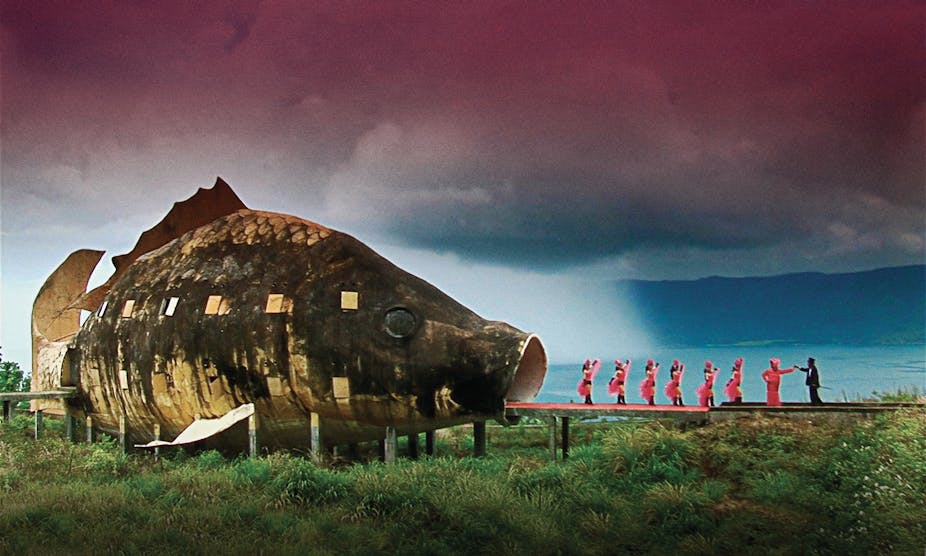This may sound like a strange request, but if you go to see Joshua Oppenheimer’s brilliant, Bafta-winning and Oscar-nominated The Act of Killing, pay close attention to the opening credits.
Before the film title itself you’ll see Dogwoof, the distributor’s logo, followed by credits to the Danish Film Institute and to the Danish production company, Final Cut for Real.
You might think from these credits that you’re watching a Danish film (or Danish-American – Oppenheimer was born in Texas). Not quite. A substantial part of the production’s costs were covered by a grant from the Arts and Humanities Research Council, awarded to Oppenheimer and one of his producers, Joram ten Brink of the University of Westminster. That’s a rare and, no doubt, a good thing.
But it also points to a big problem.
Scan the Oscar and Bafta nominations this year for feature documentaries and look at the nationalities. On both the Bafta and Oscar lists, all bar (the American-directed) Act of Killing are varieties of American. For all of the UK’s much vaunted strength in documentary, the British documentary presence in awards season this year is pitifully slim.
And one reason for that, I’d suggest, is that there is little significant contribution to British documentary from the Big Three UK film funders, he BFI, BBC Films and Film4.
Despite the widely acknowledged fact that feature documentary has been in something of a “golden age” in recent years, the idea that these key institutions of British film should support feature documentary seems to have largely passed them by.
As things stand, feature documentary makers seeking support from the BBC have one destination: Storyville, a cash-starved ghetto within BBC television. It’s a similar story with Channel 4 – the funds available for feature documentaries are vanishingly small.
It’s not just about the money. It’s an attitude thing – one that changed in the US and elsewhere a long time ago. To put this more starkly: we’re being left behind.
By the late 1980s, popular cinema-released documentaries had become a rarity, almost an oxymoron, in the US and especially in Britain. There was no money to be made from theatrical documentary – no formula that enabled studio executives to calculate risk. But most of all, documentary itself seemed something of an exhausted form. In 1990, as if to signal the decline, Bafta even dropped the theatrical documentary category from its film awards.
Two films changed this depressing landscape, and continue to exercise a profound influence: Errol Morris’s The Thin Blue Line (1988) and Michael Moore’s Roger & Me (1989).
Morris’s highly stylised exploration of a cop killing in Dallas, and the conviction – wrongly, as the film helped to show – of a drifter named Randall Adams, was the antithesis of observational, hand-held documentary. With obsessively framed, expressionistically lit reconstructions shot by Stefan Czapsky (who went on to photograph Tim Burton’s Edward Scissorhands and Ed Wood) and with music by Philip Glass, The Thin Blue Line raised the bar. It was clearly a work of cinema, and it has proved highly influential – particularly among British documentary filmmakers, including Oscar-winners Kevin Macdonald (One Day in September) and James Marsh (Man on Wire).
Roger & Me, on the other hand, quickly gained notoriety for the price that Michael Moore was offered by a major studio, Warner Brothers, to distribute his film – $3 million. The film’s mixed-mode of stunts and humour in its rage against General Motors opened the way for campaigning documentaries playing to packed cinema audiences.
Significantly, Morris and Moore both rejected the label “documentary” for their films; somewhat inevitably, neither of received an Oscar nomination. But with these films came a transformation in the fortunes of feature documentary. Going to the cinema to watch a great documentary was no longer such an esoteric pastime.
In Britain, the problem with documentary was different, and perhaps more intractable. It was simply not seen as part of film culture. It was “telly” – public service, mission-to-explain (another documentary-killing diktat), decidedly small screen. British documentaries in the age of television were first the exclusive preserve of the broadcasters.
Then, with the creation of Channel 4, independents were able to make documentaries, so long as they were happy to live a cottage industry, cost-plus, hand-to-mouth existence. And finally, with new terms of trade that released UK indies from the restrictive contracts imposed by broadcasters, “factual” was suddenly “formatted” – documentary series on television needed to earn their keep not just in ratings, but as repeatable, saleable, high-concept (“what if” we swapped marriage partners, etc) formulae.
Little of this was conducive to making expansive, ambitious, serious feature documentaries. This TV landscape was never going to produce a Waltz with Bashir, a Searching for Sugar Man or, for that matter, an Act of Killing.
But things are beginning to change. After a 21-year absence, Bafta finally reintroduced a best feature documentary category in 2011. In the US, the Academy Awards documentary voting system has been overhauled so that the best works have a better chance of being nominated. And makers of the finest documentaries are courted at major festivals like Sundance by some of the theatrical Big Beasts – Sony Classics, Paramount and StudioCanal.
For all their talent and ingenuity, British documentary filmmakers should be joining this party more regularly. But to do that they need our own Big Beasts, the BFI, BBC Films and Film4, to recognise that the essentially cinematic enterprise of modern feature documentary is no different to that in fiction films.

